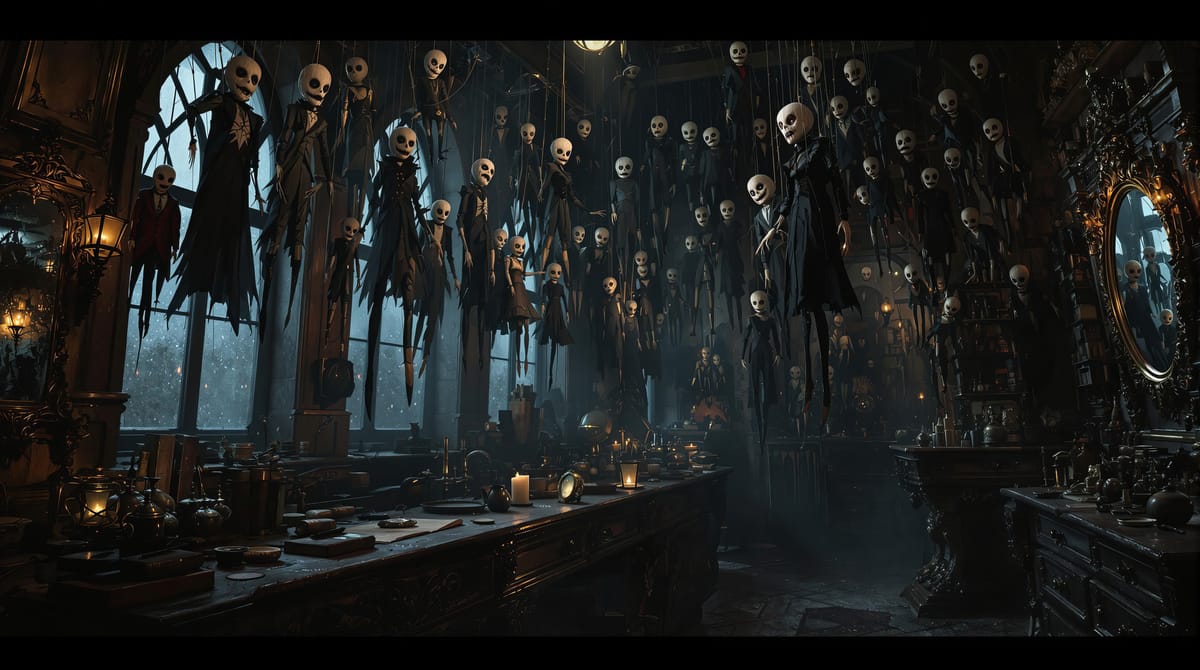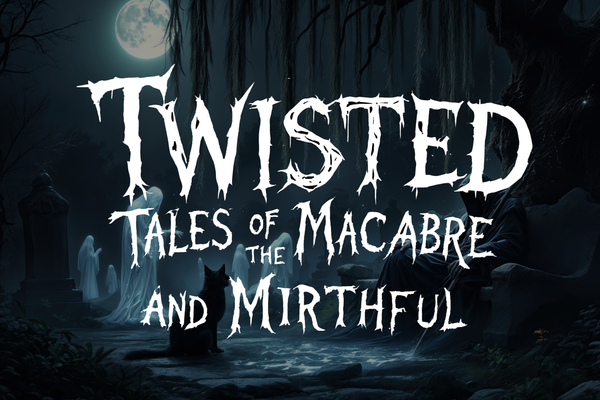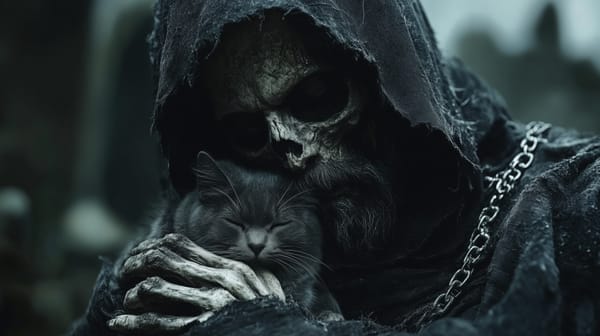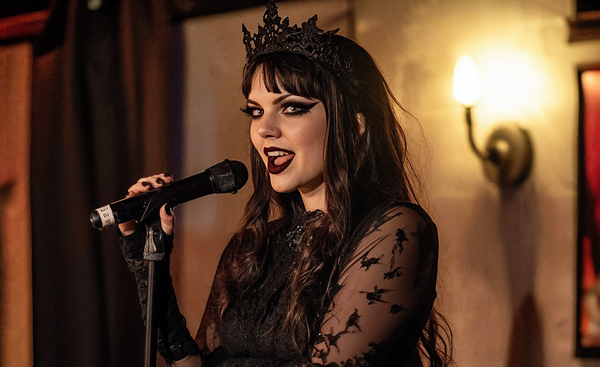Strings Of Redemption

Darklings, there's something intimate about sharing a horror story, isn't it? Like whispering secrets in the dark, or showing someone the contents of your nightmare journal. This tale - "Strings Of Redemption" - emerged during one of those endless nights when silence speaks louder than screams, and the shadows seem to write themselves across the page.
As a writer, I've always been drawn to stories that blur the line between art and darkness, between creation and punishment. There's something haunting about the idea that every piece of art carries a splinter of its creator's soul - and sometimes, those splinters fester.
This story is part of my upcoming collection "Twisted Tales of the Macabre and Mirthful," where I explore that delicate balance between laughter and terror. After all, isn't the most unsettling sound a puppet could make not a scream, but a laugh?
Settle in, dear readers. Pour yourself something dark and bitter, and remember - sometimes the most terrifying monsters are the ones we carve from our own guilt.
With shadows and stories,
Rachael Nightshade
Strings Of Redemption
A Victorian Gothic Horror Story
Rain lashed against the grimy windows of Gregory Faulk's puppet shop, each drop striking the glass like a tiny hammer on bone. Inside, the old puppeteer's gnarled fingers traced the contours of his latest creation, though he hadn't sold a piece in years. The wood beneath his fingers felt warm, too warm, like fever-touched flesh.
The shop, buried in the warren of London's meanest streets, had become both sanctuary and prison. Even now, after thirty years, he sometimes caught the scent of Thomas Winterbourne's blood in the sawdust. An impossible thing—the man had died of fever in prison, not here among the watching wooden eyes. And yet the scent remained, a copper tang that grew stronger with each puppet Gregory carved.
Wooden figures hung from every rafter, their joints creaking in the draft that whistled through warped floorboards. Some were yellowed with age, others dark as fresh-spilled ink. In the guttering lamplight, their shadows stretched and multiplied, dancing across walls stained with decades of tobacco smoke and darker things. A puppet near his workbench—a ballerina with hollow eyes—turned its head ever so slightly to watch him work. The movement was no longer subtle enough to doubt. They had grown bolder these past months, as if they could smell their hour approaching.
The bell above the door jangled, startling him badly enough that the chisel slipped, scoring a line across his palm. The blood welled up black in the poor light, and for a moment, he could have sworn the nearest puppets leaned forward, their painted lips parting.
"Mr. Faulk?" The voice was young, female, carrying an educated lilt that seemed out of place in this shabby corner of Victorian London. She stood straight-backed in the doorway, her fingers white-knuckled around her umbrella handle. Water dripped from the umbrella's tips, forming a dark pool at her feet that seemed to reflect faces that weren't there. "I'm Alice Carter. I've come about your puppets."
Gregory turned slowly, his arthritic joints protesting with sounds like splintering wood. The young woman was a stark contrast to the shop's gloom—straight-backed, clear-eyed, with a determined set to her jaw that barely masked an underlying tension. Her other hand rested at her throat, fingers absently tracing the edge of a silver locket that caught the lamplight like a captive star. There was something familiar in the angle of her cheekbones, the set of her eyes. Something that made the puppets stir on their strings with sudden purpose.
"We're closed," he muttered, turning back to his workbench. Behind him, he heard the subtle click of wooden limbs adjusting their positions, like rats skittering in the walls. "Have been for years."
"And yet you still carve them," she observed, stepping closer. Her boots clicked against the wooden floor, each step echoing off walls lined with faces frozen in various states of anguish and ecstasy. Some of those expressions had begun to shift when he wasn't looking directly at them. She paused, her hand tightening around the locket—a nervous gesture that betrayed her outward confidence. "They say your puppets capture more than mere likeness, Mr. Faulk. They say they hold pieces of the soul."
Above them, a marionette twisted on its strings, its carved fingers reaching toward Alice with terrible purpose. The joints bent backwards, wrong, like broken fingers seeking to grasp. Gregory's hands trembled as he set down his chisel, watching the puppet's movement reflected in his worn brass tools. Blood from his cut palm dripped onto the workbench, and the wood grain seemed to drink it in with eager thirst.
"Whoever 'they' are, they speak of things they don't understand." His voice cracked like dry wood. "Leave an old man to his craft, Miss Carter."
"I understand more than you might think." Her voice wavered slightly as she moved to examine a puppet suspended near the counter—a jester with a cruel smile and eyes that followed her movement. The bells on its motley had long since been silenced, but Gregory sometimes heard them late at night, ringing like mourning chimes. She squared her shoulders, fighting back whatever emotions threatened to overwhelm her. "This one, for instance. Created in 1851, wasn't it? The same year as your greatest triumph... and your greatest betrayal."
Gregory's breath caught in his throat. The lamplight flickered, and the jester's smile widened—not slightly this time, but grotesquely, impossibly wide, revealing row upon row of tiny wooden teeth. Around them, other puppets stirred almost imperceptibly, their painted eyes gleaming with an awakening hunger. The cut on his palm throbbed in time with their movement.
"How could you possibly—"
"Know about Thomas Winterbourne?" Alice's voice cracked on the name, and she clutched the locket tighter. Silver light leaked between her fingers, casting strange shadows that made the puppets' faces twist into familiar shapes. Too familiar. "About how you stole his designs, claimed them as your own? About how he died in debtors' prison while you rose to fame?" Her eyes glistened with unshed tears, generations of family pain seeking release. Above her head, the shadows of puppet strings began to weave themselves into a noose.
The shop seemed to constrict around them, walls creeping inward like a throat swallowing. The hanging puppets drew closer, no longer even pretending to be bound by their strings. Their wooden limbs creaked in symphony, a sound like gallows timber groaning under weight. The temperature plunged until frost began to form on the windows, each crystalline pattern resembling tiny, screaming faces.
Gregory's hands clenched into fists, his knuckles white with strain. Fresh blood dripped from his cut palm, and wherever it fell, the floorboards darkened and swelled as if fed. "Get out," he whispered, but the words held no power here. Not anymore. Not since the puppets had begun to whisper back.
But Alice Carter stood her ground, reaching into her reticule with trembling fingers to withdraw a yellowed letter. The paper seemed to pulse with its own inner light, like burning skin seen through waxed paper. "I'm Thomas Winterbourne's granddaughter, Mr. Faulk. And tonight," she paused, gathering her courage as the puppets loomed closer, their heads cocking at impossible angles, "tonight, you're going to tell me everything. The puppets demand it. And so do I."
"Impossible," Gregory breathed, though the word caught like splinters in his throat. In thirty years of crafting these cursed figures, he'd learned that impossible was merely a word people used to deny the horrors scratching at their door. The wood grain patterns beneath his skin writhed like worms, following the paths of guilt made manifest. "Winterbourne never married, never had children."
"He did, actually." Alice's voice grew stronger, though tears now fell freely down her cheeks, each one catching the light like liquid silver. "But his daughter—my mother—was born after he was imprisoned. She never knew her father, save for the stories my grandmother told and the letters he wrote from prison." Her eyes met Gregory's, sharp with accusation yet haunted by something deeper—a child's longing tainted by generations of grief. "Letters that spoke of a betrayal so profound it broke not just a man, but generations that followed. Do you know what it's like, Mr. Faulk, to inherit a haunting?"
The jester puppet dropped from its string, landing with a sound like breaking bones. It straightened slowly, its joints bending in ways wood should never move, bells jingling a tune that spoke of midnight graveyards and opening coffins. Other puppets followed, descending in a grotesque rainfall of wooden limbs and painted faces. Their feet clicked against the floor in a rhythm that matched Gregory's increasingly erratic heartbeat.
Thunder cracked overhead, and Gregory stumbled backward, colliding with his workbench. Tools clattered to the floor, each one striking the boards with an unnatural resonance. A chisel embedded itself point-first in the wood, and dark liquid—too dark to be water, too thick to be blood—began to seep from the wound in the floor.
"It wasn't meant to happen that way," Gregory whispered, his voice cracking like aged wood. Sweat beaded on his forehead despite the room's deathly chill. In the wavering lamplight, the drops gleamed like fresh varnish. "The acclaim, the success—it should have been shared. I told myself I'd make it right, that I'd acknowledge him once I'd established myself. But pride..." He choked on the word as a puppet version of himself performed a mocking bow, its neck twisted completely backward, face grinning at him upside down. "Pride made a liar of me."
"Pride did more than that," Alice said quietly, reaching out to touch the dancing ballerina puppet. At her touch, the puppet's wooden flesh rippled like disturbed water. Its face contorted into an expression of such anguish that the wood itself began to weep—dark, viscous tears that smoked where they fell. "It made you a murderer."
The puppets froze en masse, and in the sudden silence, Gregory could hear his own ragged breathing mingling with another sound—the soft, wet click of wooden joints beginning to splinter and reform. A mirror on the wall caught his reflection, and he saw with horror that his skin had taken on the sheen of varnished maple. Beneath that surface, something moved in patterns that had nothing to do with human musculature.
"No," he protested, though the words felt hollow in his mouth. When he spoke, his teeth clicked together like carpenter's pegs. "Winterbourne died of fever in prison. I never—"
"Fever brought on by conditions you condemned him to," Alice interrupted. Her fingers traced the ballerina's frozen features, and Gregory noticed for the first time how similar they were to Winterbourne's—not just in shape, but in the way the wood had been carved to suggest flesh wasting away, skin pulling tight over cheekbones. "A slow death watched by wooden eyes. Did you know he could see them? In his final days, he wrote to my grandmother about the puppets that visited him—said they gathered at his window, watching, waiting. Your creations, Mr. Faulk, reaching across London to witness his final moments."
The shadows in the corners began to move like spilled ink, flowing upward against gravity. They coalesced into a new form—a half-finished puppet with Gregory's features, its wooden heart exposed through an uncarved chest. Unlike the others, this one moved with a terrible grace, as if it were more alive than its fully completed brethren. As it descended, the other puppets drew closer, their joints clicking like insects devouring a corpse, their painted faces twisting into expressions that Gregory recognized from his darkest nightmares.
"Tell me," Alice demanded, though her voice shook, "how many of these puppets were carved in those months? How many pieces of your soul did you try to excise with your chisel while my grandfather wasted away in prison? How many times did you hear him screaming in the wood grain?"
The unfinished puppet extended its arms toward Gregory, an embrace or an execution. In its exposed chest cavity, something pulsed with a sickly light—the rhythm matching his own failing heartbeat. Each pulse sent waves of agony through his transforming flesh, bone and sinew arguing with wood and wire about the fundamental nature of his being.
"Perhaps," Alice suggested, her voice almost gentle now as she withdrew another letter from her reticule, "you should hear his last words. The ones you sent back unopened." The locket at her throat pulsed with a sickly silver light that cast her shadow like a gallows against the wall.
The unfinished puppet's head tilted, bone-white wood catching the light. The other puppets drew closer, forming a circle that stank of ancient varnish and older sins. Their shadows merged and stretched, becoming a tide of darkness that lapped at Gregory's feet like hungry tongues.
Gregory's hands—more wood than flesh now—trembled as he reached for the letter. The unfinished puppet intercepted it, its fingers closing around the paper with a sound like snapping bones. Wood grain rippled across Gregory's skin in sympathy, following the paths of his veins as they hardened into dark lines of heartwood.
"Yes," he whispered, tears flowing freely now—tears that hissed and smoked where they fell, leaving tiny burn marks in the shape of screaming faces. "Read it. Let me hear what I was too much of a coward to face."
Alice's fingers trembled against the letter she held, and for a moment, her carefully maintained composure cracked. "Do you know," she whispered, "what it's like to grow up with a ghost? Not just any ghost, but one carved by absence, shaped by shame?" She opened the locket at her throat, revealing a tiny daguerreotype that seemed to move in the uncertain light. The captured face aged and suffered before his eyes, flesh sinking, eyes hollowing, until it matched the gaunt features Gregory had last seen through prison bars. "My mother used to stare at his picture for hours, trying to find herself in his features. Sometimes, the picture would cry."
The jester puppet began to spin, its bells tolling a funeral dirge. Gregory watched in horror as its painted features shifted, wood grain flowing like water until it wore Thomas Winterbourne's face—gaunt and hollow-eyed as he'd last seen it through the bars of the prison cell. But worse than the face was the smile, a terrible knowing expression that spoke of patience and pain in equal measure.
"Stop this," Gregory pleaded, though whether to Alice or the puppets, he wasn't sure. Around them, other figures began to stir more purposefully. A child puppet pressed its face against a window, leaving frost patterns that formed words in a script Gregory recognized from returned letters. The ballerina's continuous dance became more frenzied, her wooden feet striking sparks that ignited and died in the shapes of broken promises.
"I'm not doing anything, Mr. Faulk. Your creations, however..." She gestured to the walls where other puppets had begun to move with terrible purpose, their strings weaving patterns that caught and reflected the lamplight like a web of razored silver. "They seem eager to perform. Each one a story you've tried to bury, each one a truth demanding to be heard." Her voice softened to a whisper. "Like me. Like all of us you left in the dark."
The lamplight dimmed of its own accord, and in the gathering darkness, Gregory saw his life's work come alive. The shadows themselves began to perform, casting scenes from his memory onto the walls with terrible clarity. A puppet of a well-dressed gentleman—himself in younger days—strutted across an invisible stage, followed by a shabby figure he recognized as Winterbourne. The scene was familiar, horrifyingly so: the day Winterbourne had shown him the revolutionary mechanism that would allow marionettes to move with unprecedented grace.
But this time, Gregory saw what his guilt had hidden. Saw how the wood of Winterbourne's puppet seemed to scream as he carved it, how each figure he'd made since carried a splinter of stolen soul. The puppets enacted their grim play with fluid precision, their joints weeping a substance that looked like blood but smelled like regret.
The transformation seized him then, wood grain erupting through his skin in patterns that spelled out confessions. Each crack and splinter was a moment of betrayal made physical, each new growth of timber a crime given form. The shop itself seemed to pulse with dark anticipation, shadows and light dancing in impossible patterns that spoke of judgment long delayed but finally, terribly, at hand.
"You carved them all, didn't you?" Alice's voice echoed strangely, as if coming through layers of rotting wood. "Every moment of guilt, every sin and betrayal—you turned them into art because you couldn't bear to carry them alone. But did you ever wonder what we carried? The children of those you wronged?"
Gregory watched his younger self examine Winterbourne's designs through a haze of transforming flesh. The shabby puppet collapsed as the well-dressed one rose, and real coins began to rain from the ceiling—each one rusted with blood, each one burning where it touched bare flesh. They rang against the floor like funeral bells, marking time in a concert of consequences.
The transformation accelerated, bark-like skin splitting along invisible seams. Gregory felt his bones reshape themselves, felt the awful moment when marrow became heartwood, when blood became sap. The unfinished puppet drew closer, its exposed chest cavity revealing the terrible machinery of justice—gears made of bone, springs of braided hair, all moving in a rhythm that matched the dying pulse of Gregory's human heart.
"I can feel them," he whispered, his voice creaking like a gallows tree. Splinters fell from his lips with each word, each one catching the light to reveal microscopic scenes of betrayal. "All of them—their stories, their pain, their—" He choked on the word 'forgiveness,' feeling it lodge in his throat like a carpenter's nail.
"Their judgment," Alice corrected softly. The locket at her throat had begun to smoke, silver melting and reforming into shapes that mimicked the puppet strings above. "That's what you feel, Mr. Faulk. The weight of every soul you splintered."
The jester puppet began to laugh then—a sound like wood being torn apart. Other puppets joined in, their carved mouths opening wider and wider until their heads split along the grain. From these wounds emerged not blood but memories, visible as smoke and sharp as glass: Winterbourne in his cell, growing thinner as winter deepened, watching puppet shadows dance across the prison walls. A young woman—Alice's mother—staring at a daguerreotype that wept real tears. A child—Alice herself—learning to hate the sound of woodworking tools.
"No," Gregory gasped, reaching for Alice with hands that were now more branch than flesh. "I never meant—it wasn't supposed to—" His fingers sprouted twigs that flowered into tiny, perfect screaming faces.
"Intentions mean nothing to the wood," Alice said. She held up the last letter, its edges blackening as if burned. "The puppets know what lives in their grain. Every lie, every theft, every moment you chose pride over truth—they remember. And now, Mr. Faulk, so will you."
The unfinished puppet pressed its hands against Gregory's chest. He felt the touch like fire, felt his ribs crack and reform into jointed segments. His spine twisted, seeking the familiar curves of a puppet's posture. Above them, the strings descended like hungry vines, weaving themselves into his transforming flesh.
"Please," he whispered, though he no longer knew what he was begging for. Mercy or justice? Salvation or damnation? The line between them had blurred like wood grain in rain.
"This is mercy," Alice said, though her voice had taken on harmonics that spoke of deeper, darker things. The locket burst open, spilling silver light that caught on puppet strings like moonlight on spider silk. "The mercy of truth. The mercy of becoming what you already are."
Around them, the shop groaned like a dying thing. The walls wept sap and secrets, decades of hidden sins rising to the surface like bodies in a flood. Each puppet began to dance—not the gentle movements of performed stories, but the terrible, spasmodic motion of hanged men.
Gregory felt the final transformation begin in his heart—felt the muscle tear and reshape itself into carved chambers where guilt could echo eternally. The unfinished puppet's chest cavity gaped wider, revealing not just mechanical works but a deeper darkness, a space where justice and mercy twisted together like lovers or enemies.
"Your grandfather," Gregory managed, his wooden lips cracking with each word, "he knew, didn't he? What the puppets really were?"
Alice nodded, tears falling like molten silver. "He wrote about it in his last letter. About how each puppet carries a splinter of its maker's soul. About how true art requires more than skill—it requires sacrifice." She touched the locket, now transformed into a miniature theater where tiny wooden figures performed scenes of remembrance and retribution. "He knew you'd understand, eventually. When the wood was ready. When the guilt had ripened."
The unfinished puppet embraced him then, its touch both gentle and inexorable. Gregory felt himself merge with it, felt the boundaries between flesh and wood dissolve into something older than either. The other puppets drew closer, their shadows forming a cocoon of judgment and transformation.
"The shop is yours now, Alice," he said, his voice now a harmony of creaking timber and fading humanity. "These puppets have stories to tell—not just of guilt and redemption, but of prices paid and debts collected. They need a keeper who understands both justice and mercy." His eyes, now painted wood but somehow more alive than ever, met hers. "Someone who knows that every performance demands its pound of flesh—or wood."
The dawn light that began to seep through the grimy windows was the color of old blood. What had been oppressive now felt consecrated, like a church built from bones and confessions. Each puppet caught the light differently, creating patterns that spoke of both damnation and grace.
Alice carefully placed the puppet that had been Gregory on the workbench. It seemed to pulse with its own dark light, a beacon of transformed guilt. The unfinished puppet had disappeared, its purpose fulfilled in the night's terrible metamorphosis. All that remained was a single string, black as sin and strong as regret, that wound itself around her wrist like a judge's brand.
The other puppets settled into new positions, their faces no longer frozen in anguish but set in the stern expression of witnesses. The jester's bells tolled once more—not a sound of mockery now, but the deep, resonant note of sentence passed and justice served.
In the morning light, Gregory's puppet conducted an orchestra that only the damned could hear, its wooden hands keeping time with the rhythm of guilt transformed but never forgotten. The puppet theater had gained a new story, written in grain and sealed with sacrifice, where every performance would remind its audience that redemption's price was measured not in flesh or wood, but in truth finally, terribly told.





